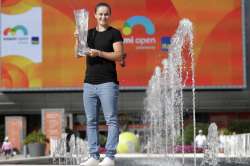33 Tournaments, 33 Champions: Ashleigh Barty beats Karolina Pliskova to win Miami Open
There still has not been a repeat champion this year among the men or women.

Amid the unpredictable swirl of this year's tennis results, with 33 different champions in 33 tournaments, Ashleigh Barty provides a change of pace. The crafty 5-foot-5 Australian mixes backhand slices and drop shots with a deceptively strong serve and a knack for attacking, which is how she won the Miami Open. Barty had a career-high 15 aces and became the newest 2019 titlist on the ATP and WTA circuits by beating Karolina Pliskova 7-6 (1), 6-3 Saturday.
That means there still has not been a repeat champion this year among the men or women.
"Amazing, isn't it?" Barty said. "On the women's side, I think the level has evened out a lot, and the depth has grown over the last few years. Everyone in the draw has a legitimate chance of winning the tournament, and you try to make the most of it."
In Miami, Barty did. The former professional cricket player won her fourth tennis title and the biggest of her career to improving to 18-3 this year. At age 22, she'll rise next week to a career-high ranking of No. 9.
Barty became the fifth different Miami Open women's champion in the past five years, and she's the 14th different WTA titlist in 2019.
Roger Federer could become tennis' first repeat champion this year when he plays John Isner in the men's final Sunday. Federer won Dubai early this month.
Barty's large repertoire of shots is both entertaining and effective, and she kept a weary Pliskova off balance while finding the open court for 41 winners.
"I've always tried to bring as much variety to the court as possible," Barty said. "It's about trying to neutralize what your opponent is doing. There was a phase in women's tennis of big power and first strikers, but physicality in tennis has grown, which has allowed more players to neutralize the big first ball and work their way into the point."
Barty can strike quickly, too. Her surprising serve was superior in the final even though Pliskova is 8 inches taller at 6-foot-1.
The Aussie won a 14-stroke rally with a nifty backhand drop shot to go up 2-1 in the tiebreaker, and she was ahead the rest of the way. She outlasted Pliskova in a 20-point game to break at the start of the second set, smacked three consecutive aces for a 3-1 lead, and won eight of the final nine points.
Pliskova, seeded fifth, blamed her fade on fatigue. Because of rain delays, her semifinal win over No. 2-seeded Simona Halep lasted until early Friday morning, and she looked flat-footed in the final.
"Run, run," Pliskova's coach, Conchita Martinez, implored during a changeover.
"I was tired, super tired," Pliskova said. "If I felt a little bit fresher, it could maybe be different."
Barty made sure Pliskova never got her second wind, striking from all over the court. Among the Aussie's most acrobatic shots was a leaping overhead winner struck while backpedalling in pursuit of a lob. The crowd loved it, and so did she.
"It's pretty cool to have played such a good match today in a big situation," she said.
Barty won the Wimbledon girls' title in 2011 at age 15 but gave up tennis to play professional cricket in Brisbane before returning to the tour in 2016.
This year she lost in the final at Sydney, a moment she listed as the most painful in her career. Less than three weeks later she reached her first Grand Slam quarterfinal at the Australian Open.
"That's why I love the sport," Barty said. "You have these amazing moments, and you have these heartbreaking moments. But the journey in the middle is pretty bloody good."